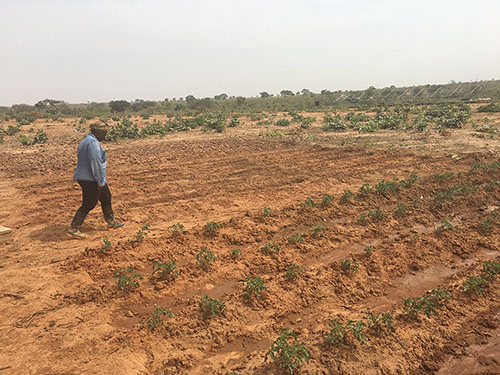Climate Change
 In addition to ensuring that all FSP activities are environmentally compliant, FSP also develops recommendations and tools that account for the direct linkages between agriculture and the drivers of climate change, resource depletion, and environmental degradation. The management of land-based resources, including cropland, grazing land, forests, and wetlands, can have a major impact on the welfare of direct resource users, as well as on many others via impacts on environmental services. If governments are to be convinced to undertake agricultural policies which affect the resource base, better evidence is needed as to why that intervention is necessary, where and for whom intervention is likely to be effective, and what impacts can be expected from interventions in different contexts.
In addition to ensuring that all FSP activities are environmentally compliant, FSP also develops recommendations and tools that account for the direct linkages between agriculture and the drivers of climate change, resource depletion, and environmental degradation. The management of land-based resources, including cropland, grazing land, forests, and wetlands, can have a major impact on the welfare of direct resource users, as well as on many others via impacts on environmental services. If governments are to be convinced to undertake agricultural policies which affect the resource base, better evidence is needed as to why that intervention is necessary, where and for whom intervention is likely to be effective, and what impacts can be expected from interventions in different contexts.
Further, global climate change poses great risks to poor people whose livelihoods depend directly on agriculture, forestry, and other natural resources. Large-scale movement of populations out of marginal areas will create stress even in areas that are not negatively affected directly by climate change. FSP’s research focuses on the assessment of, adaptation to, and mitigation of these risks to develop strategic, cost-effective, and pro-poor policy reforms that enhance human welfare in equitable and sustainable ways. FSP analyzes the complex interrelations between climate change and agricultural growth, food security, and natural resource sustainability.
Responses to climate change need to occur on several levels, including crop- and farm-level adaptations, national-level agriculture-related policies and investments, and regional and global policies and investments. Adaptation strategies include infrastructure investment, water-allocation reform, altered land use, modification in land-tenure rules, and changes in food trade. In its pilot country-level research programs, FSP works with local partners and stakeholders to characterize household resilience and vulnerability to climate change through focus-group interviews and workshops in which partners develop and analyze scenarios for vulnerable areas and assess the effectiveness and relative costs and benefits of response options and adaptation strategies. Research results generated through these activities provide policy-makers and stakeholders in developing countries with the tools for making informed decisions about adapting to climate change.
Recommended research papers:
Udita Sanga, Laura Schmitt Olabisi, Saweda Liverpool-Tasie, 2018. System Dynamics Modelling of Maize Production under Future Climate Scenarios in Kaduna, Nigeria. Feed the Future Innovation Lab for Food Security Policy Research Paper 97. East Lansing: Michigan State University.
David Mather, Nilar Aung, Ame Cho, Zaw Min Naing, Duncan Boughton, Ben Belton, Kyan Htoo, and Ellen Payongayong, 2018. Crop Production and Profitability in Myanmar’s Dry Zone. Feed the Future Innovation Lab for Food Security Policy Research Paper 102. East Lansing: Michigan State University


